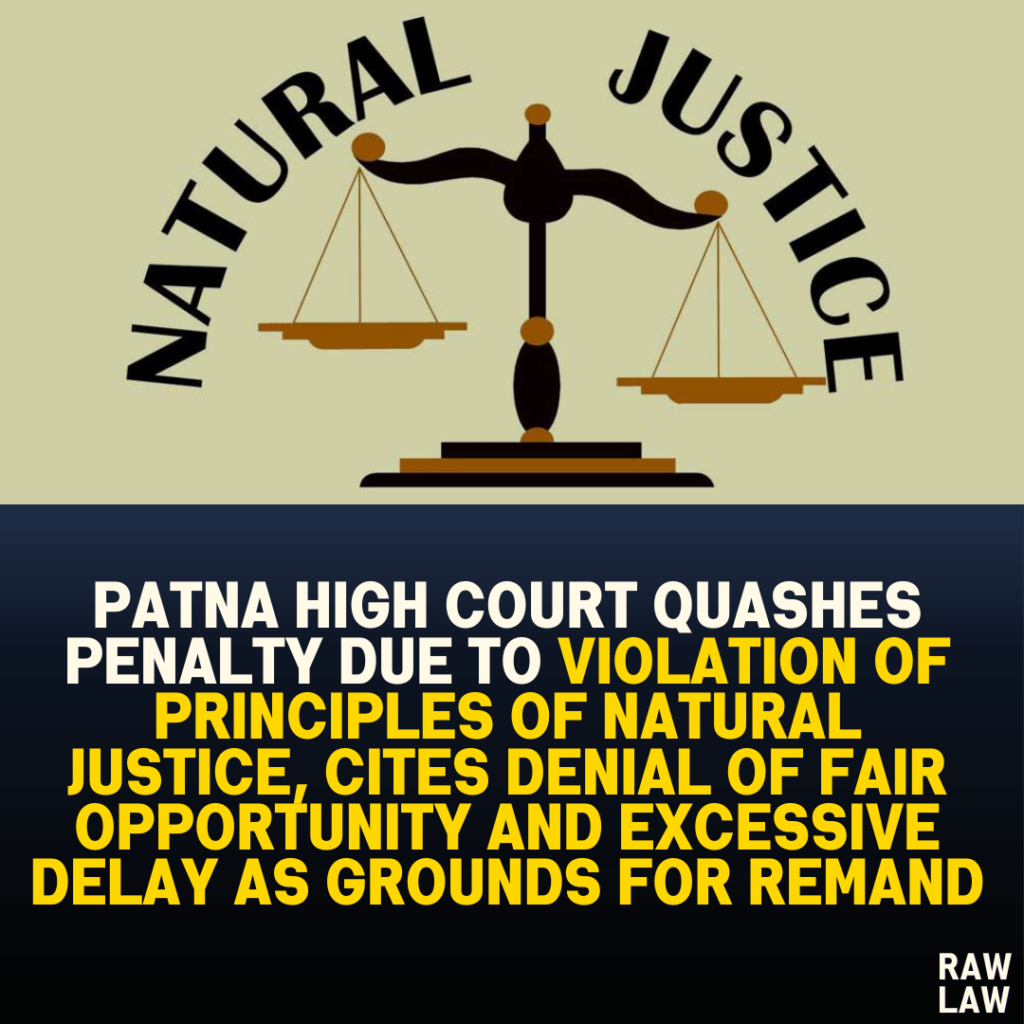Court’s Decision
The Patna High Court quashed the penalty order dated 12th August 2021, which withheld four increments of the petitioner’s salary with cumulative effect, and the review order dated 24th March 2022. The court found the disciplinary proceedings to have been conducted in violation of the principles of natural justice and held that the penalty imposed was excessive and disproportionate. The case was remanded back to the disciplinary authority for reconsideration of the punishment in light of the court’s observations.
Facts
The petitioner was serving as an Assistant Engineer in the Irrigation Subdivision under the Water Resources Department, Bihar. Allegations were made against him regarding his supervision of a construction project at R.D. 28.00 of Sukliasan Distributory, wherein irregularities in the quality and alignment of the construction work were reported. The Flying Squad of the department, followed by a six-member committee, investigated the matter and found significant defects in the structure. Based on these findings, the petitioner was placed under suspension on 09.07.2018.
On 20.07.2018, a memo of charges was issued to the petitioner, and he submitted his explanation on 08.10.2018, followed by a supplementary explanation on 28.08.2019. Despite his explanations, a formal departmental inquiry was initiated under Rule 17 of the Bihar Government Servants (Classification, Control, and Appeal) Rules, 2005. The Inquiry Officer found the charges proven, and on 12.08.2021, a penalty of withholding four increments of pay with cumulative effect was imposed on the petitioner. His review petition and request for salary for the suspension period were both rejected on 24.03.2022.
Issues
- Whether the departmental inquiry was conducted in violation of the principles of natural justice.
- Whether the penalty imposed on the petitioner was disproportionate to the charges.
- Whether the denial of full salary for the suspension period was justified.
Petitioner’s Arguments
- The petitioner argued that the departmental inquiry was conducted in violation of the principles of natural justice, as no witnesses were examined, and he was not given an opportunity to cross-examine anyone.
- The inquiry report relied solely on documentary evidence, and the petitioner was not given a fair chance to rebut the findings.
- The penalty of withholding four increments of pay was disproportionate, especially considering the procedural irregularities during the inquiry, which lasted over three years—far exceeding the one-year limit prescribed by the General Administration Department’s circular.
- The denial of full salary during the suspension period was also challenged as the suspension lasted for an extended period without proper cause.
Respondent’s Arguments
- The respondents argued that the departmental inquiry was conducted fairly in accordance with Rule 17 of the Bihar Government Servants (CCA) Rules, 2005, and that the petitioner was given ample opportunity to defend himself.
- The penalty of withholding four increments was proportionate to the gravity of the misconduct, as the petitioner’s negligence resulted in a financial loss of Rs. 13,43,042/- to the government.
- The denial of full salary for the suspension period was lawful, limiting his entitlement to the subsistence allowance only.
Analysis of the Law
The court relied on the principles of natural justice as established in various Supreme Court judgments, noting that a departmental inquiry must ensure a fair opportunity to the accused employee. It emphasized that denial of cross-examination, reliance solely on documentary evidence, and prolonged suspension without proper cause are clear violations of the rules of natural justice.
Precedent Analysis
The court referred to the decision in State of U.P. & Ors. v. Saroj Kumar Sinha (2010) 2 SCC 772, which underscored the importance of adhering to principles of natural justice during disciplinary proceedings. Additionally, the court cited Kumar Upendra Singh Parimar v. B. S. Co-opt. Land Dev. Bank Ltd. (1999 SCC OnLine Pat 1075) to illustrate that charges not supported by evidence cannot sustain a penalty. The court also referenced Amarendra Prasad v. Bihar State Financial Corporation, where the principle of proportionality in the context of penalties was discussed.
Court’s Reasoning
The court found that the inquiry process was flawed as it violated the principles of natural justice. The petitioner was not given a fair opportunity to present his defense, and the inquiry relied solely on documents without examining witnesses. Moreover, the prolonged delay in concluding the inquiry rendered the penalty excessive and disproportionate. The court observed that procedural fairness is crucial, especially when the outcome affects an individual’s career and livelihood.
Conclusion
The court quashed the penalty order dated 12th August 2021 and the review order dated 24th March 2022. It remanded the case back to the disciplinary authority for appropriate reconsideration of the penalty.
Implications
This judgment reinforces the necessity of adhering to the principles of natural justice during disciplinary proceedings. It highlights that procedural irregularities, such as denial of cross-examination and reliance solely on documentary evidence, can render penalties invalid. Furthermore, the decision underscores that penalties must be proportionate to the proven misconduct, and procedural delays can result in disproportionate penalties. This ruling serves as a reminder for disciplinary authorities to ensure that inquiries are conducted fairly and in a timely manner.




Pingback: Bombay High Court: "Magistrate's Order Directing FIR Registration After Taking Cognizance is Legally Untenable and Violates Procedural Safeguards of Cr.P.C." - Raw Law
Pingback: Patna High Court Acquits Accused Under POCSO Act: "Benefit of Doubt Given as Victim’s Testimony Lacks Reliability and Key Evidence Missing" - Raw Law